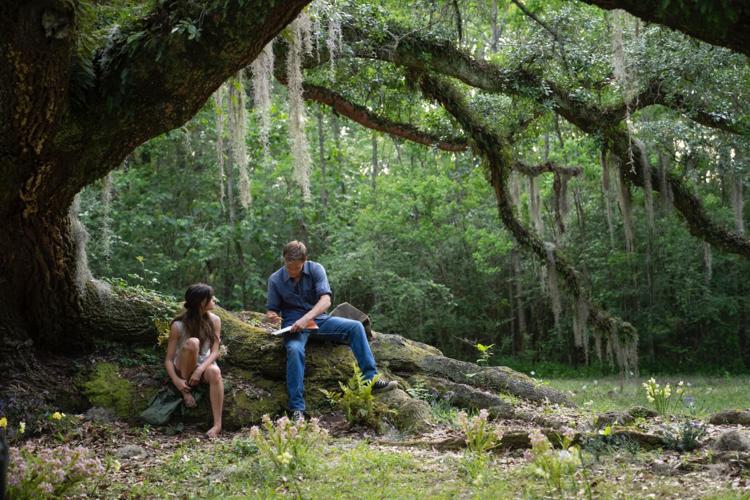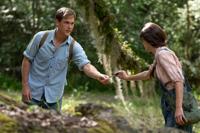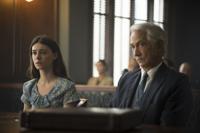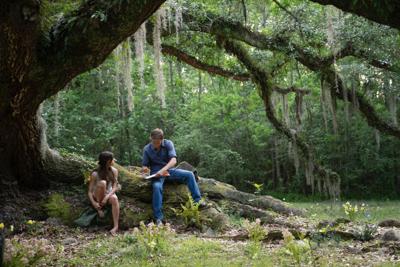Editor’s note: The views and opinions expressed in this review are solely those of Marlon Wallace and do not necessarily reflect the views and opinions of WBOC.
Delia Owens’ debut novel lived in The New York Times Best Sellers’ list for 150 weeks. It sold more than 12 million copies, making it one of the best-selling books of all-time. What helped to propel the book was it being selected by Reese Witherspoon’s company, Hello Sunshine. Its success under Witherspoon’s name almost ensured it being adapted into either a film or television series. There was quite a bit left out of this story but it didn’t seem like there was enough here to sustain a series beyond three episodes, so truncating it into a film was probably the only real way to go. The film, as probably the book, definitely feels representative of Owens’ love of zoology and her being from the southern U.S.
It seems that the themes at play in Owens’ work include prejudice, xenophobia, and misogyny. There’s a theme of using education and art to elevate one’s self. There’s also a theme of appreciating nature, particularly that of a swamp, and not dismissing living life in that location. This film is mainly set in the 1950’s and 60’s, and arguably, a lot of the things that happen are due to the protagonist being a girl in the past. In general though, the protagonist is an “outsider” and it’s that dynamic that separates her and is her major source of conflict. Given the setting, the time period, somewhat, and the fact that this film centers around a court case, it’s likely that director Olivia Newman’s goal was to invoke To Kill a Mockingbird (1962).

Daisy Edgar-Jones (Under the Banner of Heaven and Normal People) stars as Catherine Danielle Clark aka “Kya,” a young woman who lives in a veritable cabin tucked away deep in the woods, near the coast of North Carolina. It’s not just woods. It’s a marsh, and Kya spends most of her time on her small, fishing boat, which is no bigger than a dinghy. She’s constantly on the water, sailing through the marsh. As a result of an abusive father, she ended up existing by herself in that swamp for the better part of a decade.
She rarely interacts with the people who live in the nearby town of Barkley Cove. Her only interactions involve an African American couple that runs a general store. Even though it’s not operating on a racial level, she’s no more regarded than Boo Radley from To Kill a Mockingbird. When a young man is found dead, she’s accused of killing him. In that, she’s also no more regarded than Tom Robinson, also from To Kill a Mockingbird. That 1962 classic focuses on the children of Robinson’s lawyer. The point-of-view in fact was from the lawyer’s children. Here, the lawyer or the lawyer’s family isn’t the perspective. We instead stay in Kya’s point-of-view, and that perspective isn’t even about her murder case, even though we keep cutting back to those court room scenes. Instead, the real focus is Kya’s love life.

Taylor John Smith (Sharp Objects and American Crime) co-stars as Tate Walker, a young man who lives near the marsh and not far from Kya. His father is a fisherman, and Tate likes being on his boat as well. He occasionally sees Kya on her boat, as she floats by. Tate takes a liking to her and starts dating her, eventually falling in love with her. Seeing this blossoming romance is probably the best part of this film. However, for drama’s sake, there is a love triangle that ultimately felt obvious or predictable.
Harris Dickinson (The King’s Man and Maleficent: Mistress of Evil) also co-stars as Chase Andrews, the young man who becomes the other leg in the aforementioned love triangle. Other than having a nicer boat and not living near the marsh but in town, we don’t get much about Chase, which is purposeful. His personality reads as more of a person who is slumming it with her. There are some issues involving classism with his character that come up that the film could have delved more. The court case doesn’t even bring out more about Chase that might be of interest.

David Strathairn (Nomadland and Good Night, And Good Luck) plays Tom Milton, the lawyer representing Kya. He has the presence and the gravitas to pull off an Atticus Finch from To Kill a Mockingbird. He gets some good scenes in the court room, which show how poor a case there is. As the film progresses though, one thinks that its narrative will go the way of Primal Fear (1996) but it ends up going the way of Netflix’s The Lincoln Lawyer (2022). Both are murder mysteries that revel in how the killer committed the crime and got away with it. This film doesn’t have that kind of reveling or even that kind of revelation of showing us the nuts and bolts of how the killer did it. The whole thing just ends rather abruptly.
Rated PG-13 for sexual content and some violence, including a sexual assault.
Running Time: 2 hrs. and 5 mins.
In theaters.





























